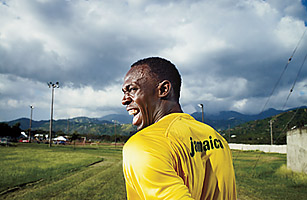
The world's fastest man sprinted past the coconut tree, down the winding hill and into the village of Cascade. On this late-November afternoon, Usain Bolt is home in Jamaica, filming a commercial for the national tourism agency, which is banking on his global stardom to lift the country's recession-racked economy. Cascade itself doesn't have much to advertise as a vacation hot spot. It's an impoverished village in the interior of a struggling country, where a handful of bars, fruit stands and vendors peddling straw baskets count as the downtown business district. But Cascade does have Bolt, and he's what's being advertised: You love this guy, you'll love his country.
When the locals heard that Bolt was arriving, they gathered in the town center, a little over 100, women and children up front. They screamed as Bolt raced by, a gazelle in a gold shirt, his long limbs churning at what could be called full speed for most humans, quarter-speed maybe for Bolt. A getaway car awaited, yet the country's greatest export since reggae slowed to walk among the people, his people.
A throng of women and girls grabbed him, hugged him, tucked themselves under his statuesque shoulders. Some latched onto him as if he were a father just home from work. Bolt's forehead teemed with stress. His eyes widened with worry; he's not comfortable with all the worship. But he posed and kept the world-famous smile on overdrive. "We've always wondered," says Veron Jackson, 37, her face flushed with joy from the close Bolt encounter, even though her 3-year-old son bumped his head in the stampede, "when it was going to be our turn."
Bolt has Jamaica — and the rest of the world — right at his supersonic feet. The fascination with the 6-ft. 5-in. (1.96 m), 212-lb. (96 kg) 23-year-old sprinter burgeoned in Beijing at the 2008 Olympics, when Bolt broke the 100-m world record although he seemed to spend the last half of the race pounding his chest in celebration. He introduced his now ubiquitous, still fairly awesome Zeus-like victory pose — one arm cocked back like an archer's, the other pointed toward the sky like an arrow — since dubbed "to the world," or as it's better known around Jamaica, "to di worl." (Or "to di flippin' worl," as a Jamaican radio host calls it.) He then danced around the track, agitating a few old fogies, delighting everyone else on the planet. Bolt crushed the 200-m record a few days later.
After that, he really turned on the speed. In 2009, Bolt single-handedly transformed the world track-and-field championships, usually of interest only to devotees, into a mandatory-viewing event. He delivered a mind-numbing 9.58 at the 100 m in Berlin, a 0.11-sec. improvement over his Beijing time. In an event in which records are bettered in hundredths-of-a-second increments, this was stupendous. Bolt then bolted on another record, 19.19, in the 200 m. "It was pom-pom-pom-pom-pom," says Verna Taylor, another Cascade resident, describing the pot banging that followed Bolt's wins at the worlds. "And den we drink di beer."
At the medals ceremony for his 200 win in Berlin — the city where Jesse Owens buried Nazi visions of Aryan superiority at the 1936 Olympics — the Germans sang "Happy Birthday" to Bolt. "I wasn't all that surprised about the 100. I knew it was going to be a fast race," he tells Time during a break in his tourism shoot. "But the 200 one, I was like, 'Whoa!'" He laughs. "That caught me off guard." His competitors give him more credit. "We were all in a state of awe," says American Shawn Crawford, the 200-m Olympic gold medalist in Athens in 2004, who finished fourth in Berlin. "Like, 'Dog, he's about to break into the 18-sec. realm.' It's like you're witnessing a miracle."
The beauty of sprinting lies in its simplicity. Running is the rawest form of athleticism: no piece of equipment can control your fate; no teammates can lift you up or slow you down. It's just you and your motor to the finish. And when Bolt hits speeds approaching 30 m.p.h. (48 km/h) on the track, we witness man morph into machine. "It's really humbling," says Bolt when asked to reflect on his records. "You can say, 'Oh, my God, I'm doing this.'" Besides bringing singular joy and potential economic benefits to his country, Bolt's historic runs in Berlin and the prospect of more broken barriers could make him the most celebrated and debated — Is he doing this without performance-enhancing drugs? — athlete of the next decade. As Michael Johnson, the four-time Olympic gold-medal winner whose 200-m record Bolt has shattered, puts it, "He has made people stop and rethink what humans are capable of doing."